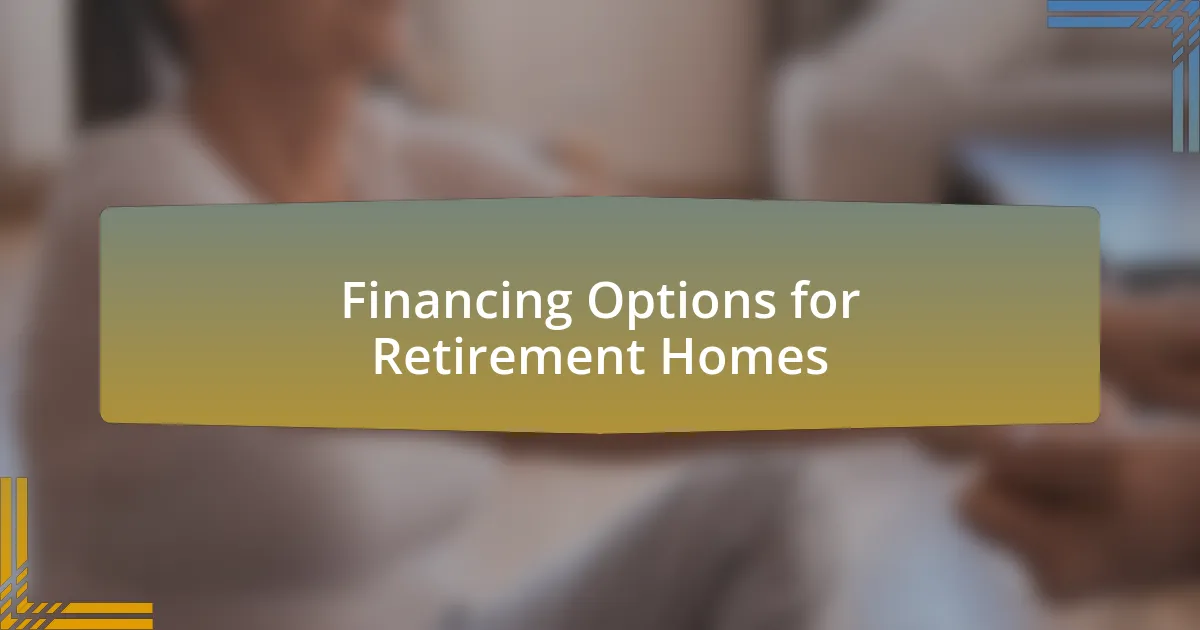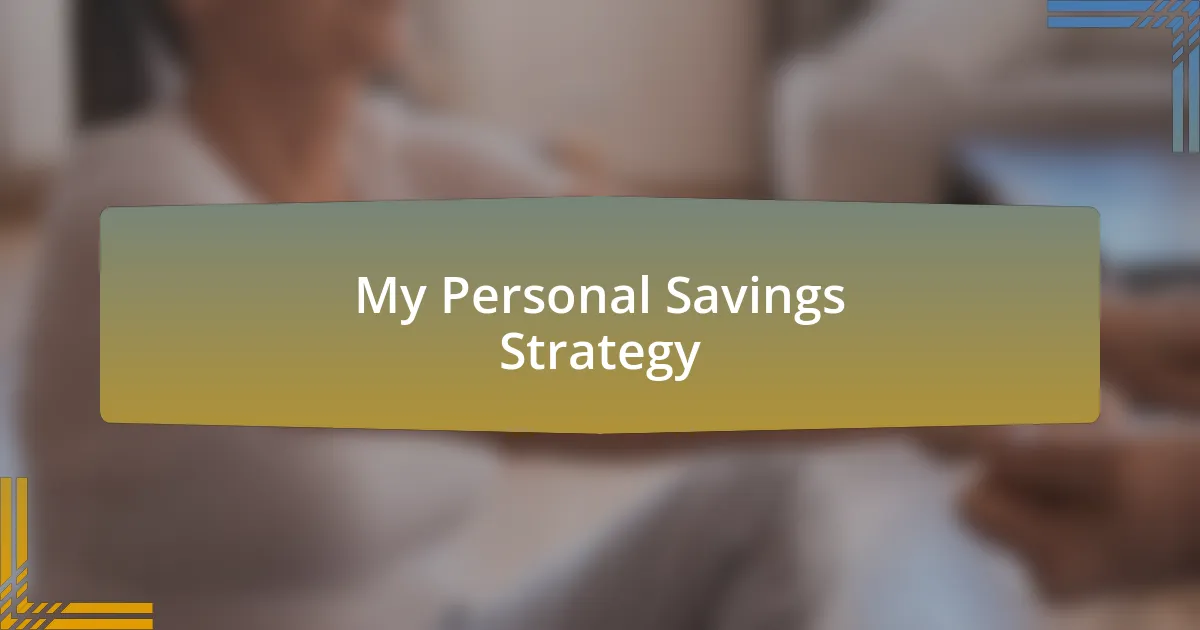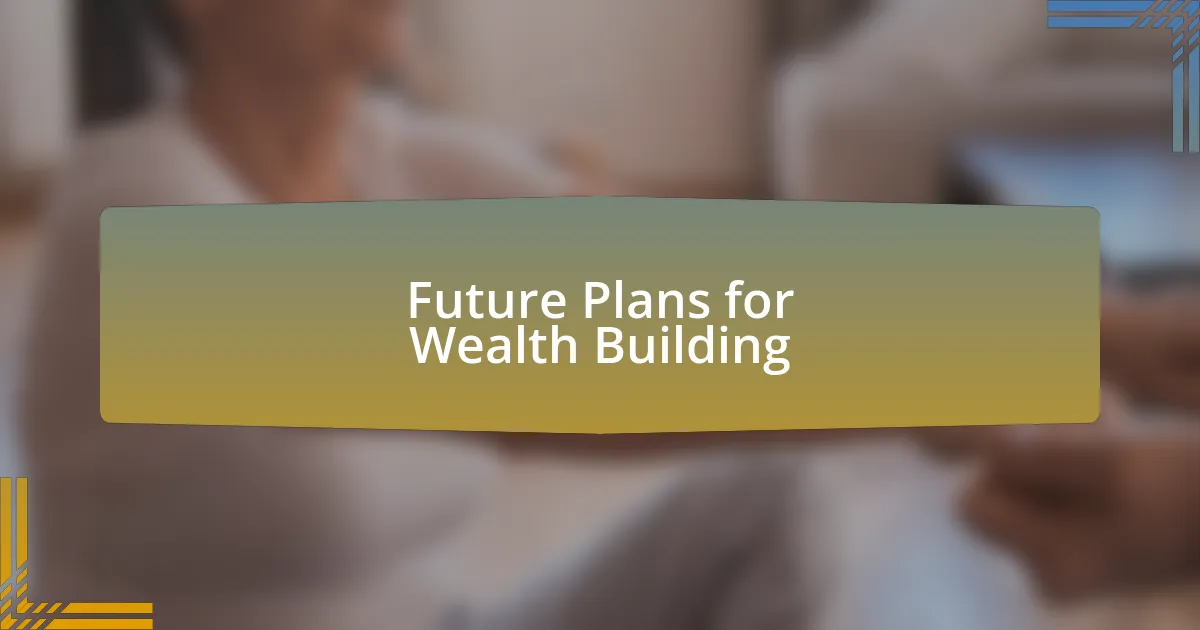Key takeaways:
- Luxury retirement homes offer extensive services, fostering community and enhancing residents’ quality of life through social engagement and wellness programs.
- Important factors when selecting a retirement home include location, available services, and the atmosphere, all of which contribute to the overall living experience.
- Understanding financing options, such as selling a home or utilizing reverse mortgages, is crucial for a smooth transition to luxury retirement living.
- Building wealth requires adaptability, networking, and patience, with a focus on diversified investments and financial literacy for future growth.

Understanding Luxury Retirement Homes
Luxury retirement homes are more than just places to live; they represent a lifestyle choice centered around comfort, quality, and community. I remember visiting a luxurious facility and being struck by the serene atmosphere, beautiful gardens, and vibrant activity calendar. It made me wonder, how do these spaces so effectively blend comfort with elegance to create a truly enriching environment for residents?
One of the most appealing aspects of luxury retirement homes is the extensive range of services they offer, from concierge-style assistance to gourmet dining options. I once spoke with a resident who shared their joy in attending a cooking class led by a professional chef—an experience they could have only dreamed of in a more traditional setting. Can you imagine blending gourmet cuisine with social experiences in your golden years?
Moreover, these homes often foster a strong sense of community, allowing residents to engage in meaningful relationships and activities. I recall chatting with a couple who had formed lifelong friendships through book clubs and excursions. It’s fascinating to think, isn’t it? In such residences, the focus is not just on luxurious amenities but on enhancing the quality of life through shared experiences and connections.

Benefits of Luxury Retirement Living
Luxury retirement living undeniably elevates the quality of life for its residents. I recall a conversation I had with a resident who felt that the personalized wellness programs in their community transformed not just their physical health but also their mental well-being. Think about it—having access to tailored fitness classes or spa treatments right at your doorstep isn’t just a luxury; it’s an investment in your future vitality.
Another significant benefit is the peace of mind that comes with living in a secure environment. I remember visiting a luxury retirement home where an elderly gentleman shared how much he appreciated the 24/7 security and assistance. Isn’t it comforting to know that help is always available if needed? This added layer of safety allows residents to fully enjoy their time without fear or anxiety, fostering a sense of freedom that is often hard to find.
Furthermore, the diverse array of enrichment opportunities in luxury retirement homes is impressive. I once attended a community event where residents showcased their artistic talents in a vibrant gallery night. Can you envision the joy in those moments, where creativity is celebrated and shared? These activities foster not only personal growth but also a dynamic community spirit that makes luxury retirement living feel like a true home.

Factors to Consider When Choosing
When selecting a luxury retirement home, one of the most critical factors to consider is location. I remember visiting a stunning community nestled near a serene lake, where residents could enjoy leisurely walks and picturesque views. Does it get any better than waking up to such beauty each day? Being close to family, friends, and essential amenities can significantly enhance the overall experience and make you feel more connected to the world outside.
Another essential factor is the range of services and amenities offered. I once spoke with a resident who was thrilled about the cooking classes available in their community. For someone who loves to explore culinary arts, those classes weren’t just fun; they were an opportunity to socialize and develop a new skill. Think about it: would you rather spend your evenings watching television or learning something new in a vibrant, supportive environment?
Lastly, consider the community culture and atmosphere. I recall attending a gathering where everyone shared their travel stories, and the warmth and camaraderie were palpable. It made me ponder: how important is it for you to feel a sense of belonging in your new home? The right environment can foster lasting friendships and create a true sense of community, making it crucial to choose a place that resonates with your values and lifestyle.

Financing Options for Retirement Homes
Financing a retirement home can often feel overwhelming, yet there are various options to consider. I remember grappling with the decision myself; it was crucial to explore everything from personal savings and retirement accounts to long-term care insurance. Each choice has its nuances, but knowing the landscape of financing options can empower you to make a more informed decision.
One avenue that stands out is using the equity in your home. I once had a neighbor who sold her family home and used the proceeds to move into a luxurious retirement community. This approach not only provided her with financial freedom but also allowed her to indulge in a lifestyle she had always envisioned. Have you ever considered how your current home could be a stepping stone rather than a hindrance in your transition to retirement living?
Additionally, reverse mortgages can offer a creative solution for those looking to stay in their homes longer while accessing cash. When I first learned about this option, I was intrigued by the idea that my neighbors could maintain their lifestyle without the burden of monthly payments. It made me think: what would it be like to have financial flexibility while enjoying your golden years? Understanding these options can truly open doors to a comfortable retirement life.

My Personal Savings Strategy
When it comes to my personal savings strategy, I like to think of it as building a safety net for my future. Initially, I started by setting aside a small percentage of my income every month. It felt daunting at first, like trying to fill a bottomless pit, but over time, I began to see those contributions accumulate, turning into a significant amount that provided peace of mind about my retirement.
I also learned the importance of budgeting—so many of us overlook the little expenses that can add up over time. For example, I created a detailed monthly budget that not only tracked my essential bills but also highlighted areas where I could cut back. One surprising realization came when I discovered how much I was spending on dining out. By cooking more at home, I saved enough to bolster my savings account. How often do you consider the impact of those little daily choices on your financial health?
Lastly, I began to explore investment options, knowing that simply saving wasn’t enough to build substantial wealth. I remember attending a financial seminar where the speaker emphasized the power of compound interest. That was a lightbulb moment for me. Investing in a diverse portfolio felt like a rollercoaster ride initially, but the potential rewards reassured me. Have you thought about how your money could work for you rather than just sitting idly? Watching my investments grow over time has transformed my perspective on savings, shifting from a simple necessity to an empowering journey.

Lessons Learned from My Journey
One of my significant lessons was the value of adaptability. I recall the moments when my initial investment choices didn’t pan out as I expected. Instead of feeling defeated, I chose to reassess and pivot my strategy. That experience taught me that flexibility is crucial in financial planning. How often do we hold on too tightly to our plans, fearing change? Embracing the unexpected can often lead to better opportunities.
Another important insight was the power of networking. Early in my journey, I attended local investment clubs where I met others sharing similar aspirations. Hearing their stories and strategies helped broaden my perspective and encouraged me to take calculated risks. Have you ever considered how the people around you can influence your wealth-building journey? Those connections not only provided advice but also fostered accountability, pushing me to stay committed to my goals.
Finally, I’ve come to realize that patience is a virtue in the journey toward wealth. Investing often requires a long-term outlook, and I found myself frustrated during market dips. During one particular downturn, I felt a wave of panic wash over me, but I learned to see these moments as part of the natural cycle. Understanding that growth takes time helped ease my anxiety. How do you handle setbacks in your financial journey? Fostering patience has helped me not just in finance but in many aspects of life, leading to clearer decision-making.

Future Plans for Wealth Building
Future Plans for Wealth Building
As I map out my future wealth-building strategy, I’m honing in on diversified investments. Just last year, I decided to allocate some resources into real estate, a move that felt both exciting and daunting. Have you considered branching out into different asset classes to safeguard your portfolio? I’ve realized that each new venture can provide not only financial growth but also fresh learning experiences.
Moreover, I’m actively seeking ways to improve my financial literacy. I found that attending workshops and reading detailed books on economics gave me a clearer view of market trends. Isn’t it empowering when you grasp complex topics that once seemed overwhelming? Gaining this knowledge fuels my confidence, enabling me to make more informed decisions.
Lastly, I envision integrating sustainable investing into my plans. This notion resonates deeply with me; aligning my investments with my values not only helps the planet but also appeals to a growing market trend. How often do we think about the impact of our financial choices beyond just profit? I believe focusing on sustainability will not only benefit future generations but is also a wise financial strategy that can yield substantial returns.